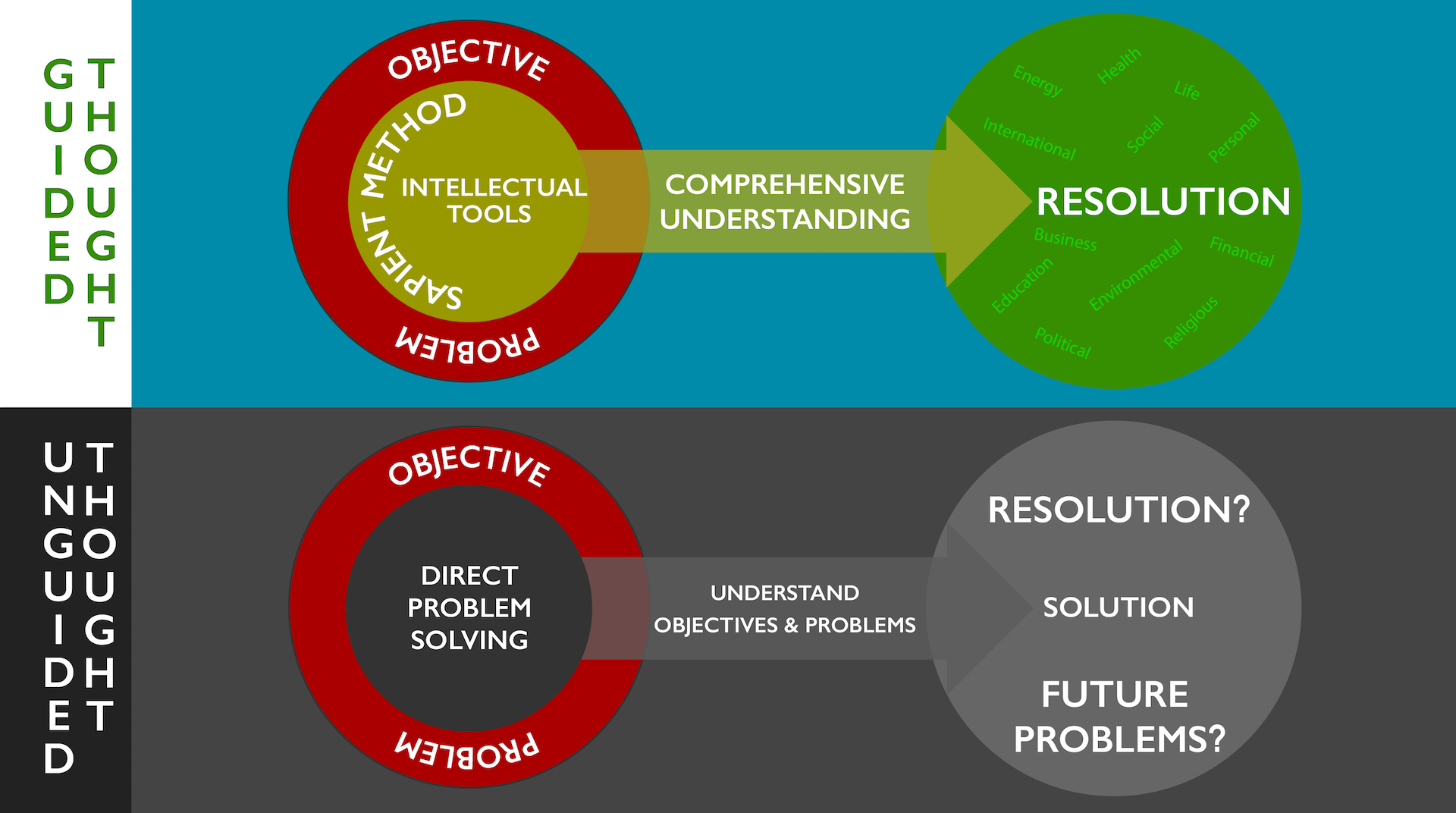The Sapient Method Guides The Way To Sustainable Success:
By Empowering Us To Consciously "See The Wood For The Trees".*
( * John Haywood 1546 U.K.)
Through our current way of thinking it is difficult to know how to positively:
- - resolve real world challenges:
- - climate change or environmental issues,
- - geographical or political disagreements,
- - redesign infrastructures that are experiencing issues,
- - achieve non-straightforward objectives:
- - optimally expand a profitable business,
- - productively design and implement novel projects,
- - smoothly purchase a home for the first time.
- - supports & guides people in teams (through questioning) to:
- - measurably know how to resolve complex challenges,
- - confidently see how to reach objectives and maintain success,
- - calmly achieve optimal and productive consensus win-win decisions,
- - comprehend how natural systems are designed to be sustainable,
- - assemble and share a guiding and visual understanding of:
- - the big picture that places objectives and challenges into context,
- - design ways to question that naturally lead to understanding,
- - translate questions into measurable answers ready for incorporation into understanding,
- - organizes and presents the intellectual toolbox to:
- - visualize and share: information, knowledge, and understanding,
- - validate: sampling strategies, collected information, and understanding.
Contact Us - if you would like to see the method in action.
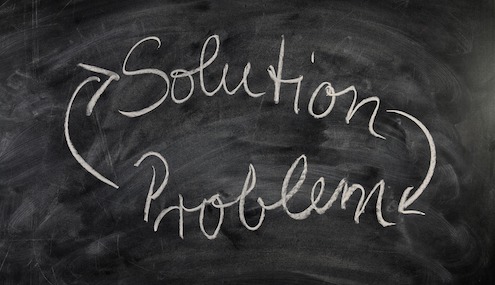
It is becoming increasingly apparent that individually and collectively we all face a growing number of serious and currently incomprehensible challenges in, and to, our lives.
Climate change and increasingly serious issues with malware ransoming people, businesses, and cities represent a small fraction of the actual challenges that we currently all face in our lives, businesses, societies, and environment.
All of the issues that we face can be attributed to each of us and our ongoing actions, that result from our conditioned perspective of thinking (i.e., our learned way of seeking goals).
We are conditioned to seek objectives and solutions directly, by 'consciously' imagining objectives as if they were ahead of us in the future, and following a direct and straightforward path to them.
We resolutely pursue our imagined path to our objectives, solving each individual challenge that we sequentially encounter on the way, until we successfully reach our goals.
We create problems for ourselves and others, as we focus on directly seeking objectives, and can't see the consequences of our straightforward actions to the real non-linear world.
We inherited our approach of thinking from our ancestors (i.e., cavemen), who used this way of thinking to successfully solve immediate straightforward problems that were right in front of them.
By considering only our objectives and problems as if they were straightforward we create problems and confusion, as our approach doesn't fit the way reality is built and functions.
Our conditioned straightforward approach to thinking leads us to:
- - needless confusion, as we:
- - acquire knowledge, but cannot see how the pieces fit into a whole understanding,
- - are unable to understand real world situations which don't fit our way of thinking,
- - instability (i.e., lack of sustainability or long term success):
- - as we focus on objectives to improve our lives and businesses, we don't see or notice the consequences of our straightforward actions to ourselves, others, or the environment that we rely on - until problems in these areas are directly in front of us to be noticed, and have become immediate and alarming.
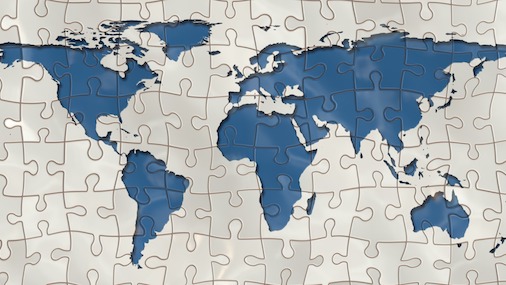
The single solution to our challenges is to 'consciously look and see' the wood for the trees, to appreciate how to reach objectives while seeing and respecting our surroundings.
When we walk into a room we look around, 'unconsciously' and comprehensively understand the room and all of its contents, and confidently and successfully interact with that environment.
'Unconsciously' we appreciate that everything in the world has a relative position, function, and shape (i.e., nothing in reality is straightforward as everything shares these characteristics).
Through our 'unconscious' comprehensive understanding we see objectives and wisely walk around obstacles to reach goals, thus respecting ourselves and working with the environment.
Our current 'conscious' way of thinking is comparable to walking in straight lines blinkered, we see and can reach our goals, but sooner than later we will bump into or step on something that we don't see, and damage ourselves and the environment.
We are naturally intelligent, but to 'consciously' succeed we must be taught: the principles that things work by, shown how things work as a whole, and practice with the whole.
Objectives and problems are like puzzle pieces: they fit into a whole, to know how to succeed appropriately we must see the whole, and to succeed sustainably all the pieces must be fitted into the functioning whole.
However, when the jigsaw pieces aren't assembled and we lack an understandable picture everything seems bewildering, especially if we haven't been shown how to solve jigsaw puzzles.
But, by seeing a completed puzzle, having the pieces explained to us, and watching how to assemble the pieces into the whole, we can assemble any puzzle irrespective of the picture.
Similarly, by being guided along the journey of disassembling and reassembling understanding from information, and how to resolve real world problems through understanding, we can reach objectives by respecting the whole.
Like to a jigsaw puzzle there are many different puzzles (i.e., objectives and problems), but relatively few ways to assemble understanding and solve problems.
More: Read our blog post on: 'Seeing: How To Succeed'.
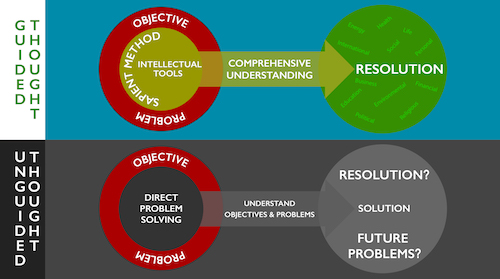
The Sapient Method Guides Us To Sustainable Success:
The Sapient Method allows us to see the big picture as it initially focuses on looking at the big picture and then guides us to see the natural routes to objectives within the big picture.
People learn the method collaboratively by guided active questioning and visualizing: problem solving, understanding, and how all things in the world are assembled and function together.
Once learners can visualize the optimal path to solve problems through visible 'comprehensive' understanding learners practice resolving an array of problems using intellectual tools as needed.
The Sapient Method guides us to return to our tried, tested, and productive (but now forgotten) way of learning and mastering anything.
We learned everything that we 'consciously' know from childhood through: curiosity, questioning, and doing; to build our integrated abilities and understanding of the world as a whole.
As all children learn and master everything this way, and as all children acquire almost all of the essential skills early in life, we trivialize children's considerable accomplishments and the astounding benefits and speed of this way of learning and achieving.
As the method itself, and the skills acquired through the method, are mastered through inquiry, questioning, and actively doing they become automatic life long abilities.
The method is learned through the guidance of a facilitator who poses readily answerable, carefully crafted and organized, questions to many individuals in the team or to the whole team.
By experiencing the variety of answers to questions, and challenges to the answers to questions as a whole, team members acquire new insight, perspective, and the means to validate ideas.
During the learning process, exercises and intellectual tools are incorporated into the method as their need becomes apparent (e.g., tools to see, build, validate, and walk understanding).
Exercises and intellectual tools are learned through initial questioning and discussion, but are mastered through practice; initially within small groups, separately, and finally within the team.
Throughout the Sapient Method all learners master the skills of:
- 1) learning, mastering, explaining, and teaching,
- 2) building, visualizing, validating, and communicating 'comprehensive' understanding,
- 3) employ 'comprehensive' understanding to determine how to meet objectives, avoid and resolve problems, and restore and maintain the health of whole real world systems.
The Sapient Method can be readily distributed and taught by anyone who has mastered the method, possesses the structured course materials, and can act as a facilitator to others.
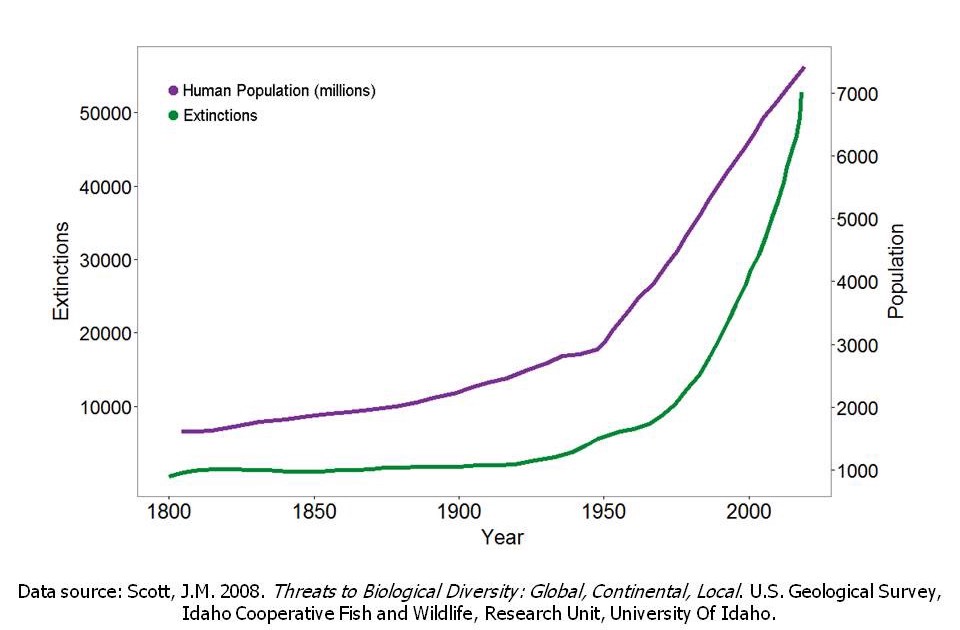
Example: Questioning (Looking) Puts Us On The Path To Wisdom
We can generally appreciate that we are all contributing to problems (e.g., environmental damage) and that we may collectively be going in the wrong direction.
We can specifically appreciate the consequences of our combined actions; e.g., by examining the relationship between the increase in the number of people and the concordant increase in the number of species that have become extinct within the last 250 years.
We can also understand, and accept, that there is a specific problem with plastic waste; as we see plastic accumulating in the oceans and animals dying from ingestion or entrapment by plastics.
However, through our conditioned problem centric approach to thinking we don't readily appreciate what has 'specifically' gone wrong, or understand what any of us can 'specifically' do to solve all of the apparently different issues that we (individually and as organizations) face and contribute to.
Through our current approach to thinking we hope (but don't necessarily believe) that we can 'specifically' help to solve the problem of accumulating plastic waste; by ending the use of ‘single-use’ plastics such as plastic packaging, shopping bags, or plastic straws.
The elimination of ‘single-use’ plastics, by everyone, represents a positive move and forms a part of the resolution to the problem (i.e., a 'specific' solution that most people are willing to sign up to).
However, how does this significant single 'specific' solution relate to the global issue of accumulating human-made non-biodegradable plastic waste in general?
How effective is our 'specific' solution with respect to all plastics or the more than 1500 other synthetic, non-biodegradable, chemicals and wastes that we discard daily into the environment, and which contribute to the extinction of 200 species of animals, plants, and fungi every 24 hours?
Our problem centric approach to thinking: has produced our contemporary challenges, doesn't adequately contribute to the resolution of our contemporary issues, and frequently results in our moving problems around or replacing problems one for another.
We create issues with environmental wastes by: inventing synthetic chemicals, relying on manufactured chemicals to conveniently and directly solve problems for us, individually purchasing and using these chemicals, and disposing of these chemicals into the environment without regard for how the environment can process these unnatural substances on our behalf.
Unfortunately, even today we don't adequately know how to breakdown or dispose of most of the synthetic chemicals we have invented, increasingly produce, and discard into the environment (and which have resulted in considerable environmental damage within the last 250 years).
A resolution to our challenges is achievable, through: 1) a willingness to change our perspective of thinking, 2) 'comprehensively' understanding our mistakes, and 3) by people, businesses, and society working together to resolve problems for the benefit of all.
Thinking 'Comprehensively' Upfront Pays Considerable Dividends Down The Road:
By seeking to understand the situation, or environment, that problems exist within we can view the resolution to problems from a different perspective (i.e., by seeing the wood for the trees).
From the perspective of 'comprehensive' understanding we can identify common resolutions to multiple causes of many problems, as opposed to individually treating individual problems in isolation (and causing unexpected, but foreseeable, downstream problems).
'Specifically' Questioning Our Problem With Plastic Waste:
By specifically questioning the nature of plastic wastes we can appreciate that plastics are a growing problem as they are produced, used, and discarded by us much more rapidly then they can be broken down by the environment where we discard them.
'Generally' Questioning Our Problem With Wastes:
By generally questioning the nature of wastes we can appreciate that:
- - wastes can be biologically active (e.g., herbicides, fertilizers, and drugs), physically active (e.g., carbon dioxide, or energy), or relatively inert (e.g., plastics),
- - all wastes are harmful to the environment when they accumulate and affect the millions of natural and unseen interactions that we and everything depend on,
- - biologically and physically active wastes are much more harmful to the environment as they are invariably active when they are discarded and interact in many more unanticipated, unknown, and unseen ways with animals and plants (than inert wastes).
'Comprehensive' Solutions To Our Personal Waste Problems:
As we (have been conditioned to) want an immediate direct solution to an identified problem we vastly underestimate the accumulative benefits of many small and easily implemented actions to resolve both local and global problems.
To appreciate what any of us can do to help the environment we can be guided by simple rules: 'if we wouldn't want to eat it', or 'don't specifically know how it is safely broken down in the environment' we should minimize or not use it (i.e., if it's not naturally good for us how is it good for the environment?).
By eliminating all careless wastage in our lives we can have a large benefit on the environment (especially if everyone commits to this approach). Currently, each of us individually carelessly wastes between 20 to 50% of all of the things we buy, use, or consume.
For example, by physically unplugging all electrical devices that are not directly in use we can save up to 20% on our electricity bill, consume up to 20% less electricity, and generate up to 20% less CO2 through electricity consumption (i.e., simply by preventing vampire or standby power).
Through 'comprehensive' understanding we can personally specifically contribute to the resolution of environmental damage through waste by:
- - minimizing the amount of things we consume (e.g., chemicals, energy, or objects),
- - doing more things around the house and garden without chemicals (e.g., pulling up weeds by hand and not using herbicides or powered devices),
- - not using needless chemicals (e.g., using simple soaps without coloring, scents, or antibacterial agents),
- - reducing careless wastage (e.g., buying the minimum quantities of perishable items),
- - only using non-biodegradable products when absolutely essential,
- - using our own packaging (e.g., bring our own bags to the store),
- - purchasing items without packaging or with minimal biodegradable packaging.
The more we question and share 'comprehensive' understanding, and discuss resolutions the more people, businesses, and society can implement convenient solutions to local problems that combine and contribute synergistically to the resolution of global issues.
As we all contribute to contemporary problems, we must all contribute to the resolution of our problems. To resolve our problems we must change how we do what we do; by learning to consider the bigger picture to reach our individual goals and sustain our collective successes.
We Can All Individually Help:
- History demonstrates that: individuals have the greatest power and voice to effect positive change, and that all change begins with individuals.
- Through our willingness to: 1) help, we can accomplish more than we believe, 2), learn, we can intellectually grow and accomplish ever more, and 3) discuss, we can share ideas and readily help one another and the environment.
Colleges And Universities Can Help:
- Universities and colleges are established professional bodies with the skills and resources to provide people and society with appropriate training to know how to make the necessary changes for the benefit of all.
- As longstanding institutes, colleges and universities are ideally positioned to rapidly distribute new and appropriate ways of thinking and learning for people to know how to resolve contemporary challenges in their lives, businesses, and the environment.
Businesses Can Help:
- Successful businesses provide people with needed goods and services. As the needs and requirements of people change, successful businesses change to meet those needs.
- Businesses who appreciate how they contribute to sustainability within their own infrastructure, society, and the environment can be optimally profitable; as they can optimize production processes, adapt to changing product needs, and successfully communicate with customers as customers invariably become more questioning of promoting sustainability.
Organizations Can Help:
- The increasing awareness of cascading problems throughout our infrastructures (i.e., malware, hacking, and electrical failures) highlight the need for organizations to question and redesign their informational systems at a fundamental level.
- Appreciating how natural systems address issues of productivity, adaptability, integrity, and sustainability can be of considerable benefit to organizations, who face these challenges today while nature successfully and sustainably resolved these challenges millennia ago.
To Move Forward And Sustainably Succeed We Need To:
- Understand - THE ISSUES: That Currently Limit Our Sustainable Success
- Recognize - THE NEED: For Understanding & For Support To Understand
- Appreciate - THE SOLUTION: Of Seeing The Way To Understanding & Success
- Observe - THE REWARDS: Of Each Of The Perspectives Of Understanding
- Discuss - CONTACT US: To See How We Can Help Each Another
- Help - SUPPORT US: To Support Each Other
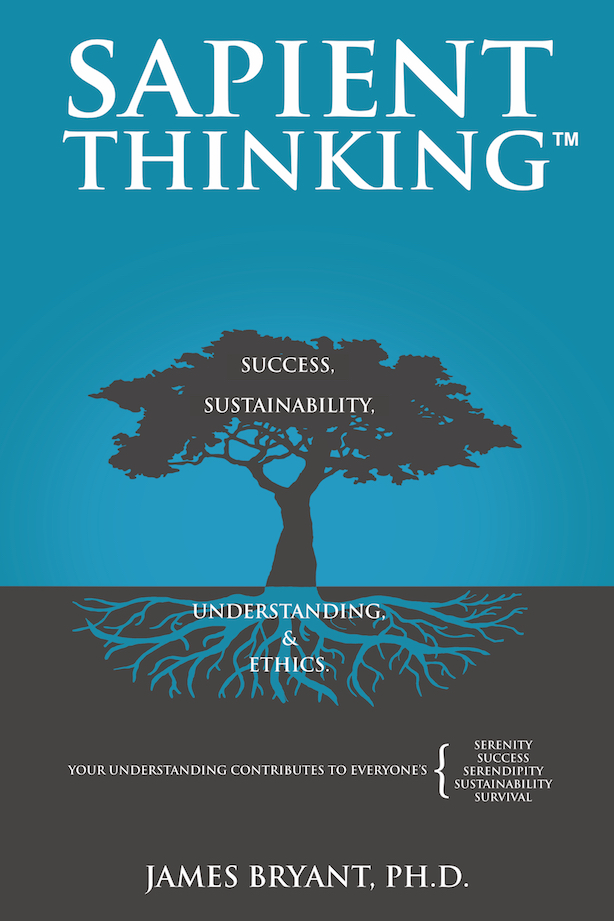
In our first publication 'Sapient Thinking' we explore the natural trend and journey of people, societies, and humanity towards caring and wisdom (i.e., the action of individuals for the benefit of all within the whole, through mindful win-win decisions).
At the beginning of the book we will examine the historical development of humanity's way of thinking and approach to problem solving, i.e., directly using physical and intellectual tools.
Through our ancient inherited approach to thinking, ways of understanding, and our creations we have built the paradoxes of our times: we are successful yet face self-imposed threats to our survival, we are extremely intelligent yet undermine our intelligence with our intellectual creations.
Through the appreciation of how we arrived at our current position, and the understanding of our contemporary problems, we will explore the changes that we must make to move forward mindfully and wisely for our long-term (i.e., sustainable) survival, success, and happiness.
Through 'Sapient Thinking' we will examine how individuals and cultures have contributed to the guidance of humanity toward wisdom, how the message has remained remarkably consistent throughout history, and how different people and cultures have said the same thing differently over time (e.g., in eastern and western philosophy, and the contributions of famous scientists)
Throughout the book we will explore: the conserved natural rules of everything around us, how we are built to understand these rules and the world around us, and how we can come together as people and work sustainably with nature through an understanding of these rules (i.e., by choosing to see the wood for the trees, instead of isolating ourselves through our specific focus on individual trees).
You may explore 'Sapient Thinking' further, by reviewing:
- - our website (i.e., THE ISSUES, THE NEED, THE SOLUTION, THE REWARDS),
- - each of the specific book summaries at the end of each respective web page (5 total),
- - the back cover of 'Sapient Thinking'.
'Sapient Thinking' should be available on Amazon.com at the beginning of 2020.
However, we are seeking funding and donations to finalize the editing and publishing of the book,
and to help distribute The Sapient Method to empower everyone to 'see the wood for the trees'.

